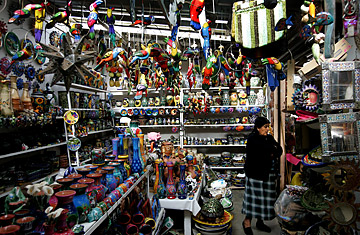
A vendor waits for customers at an artisan market in Rosarito, Mexico. The tourist industry in some Northern Mexican resort towns is feeling the effects of the ongoing drug war.
(2 of 5)
In once popular Rosarito Beach, where some 1.5 million tourists usually visit each year (and where 14,000 U.S. residents have homes), the narco-war news coverage has "murdered" business, according to city mayor Hugo Torres. Tourism in the first months of the year is off nearly 90%, he says.
Last month, the U.S. State Department took the unusual step of issuing a warning to U.S. citizens to avoid Mexico's border towns, like Rosarito Beach. Big California universities, like UCLA, have also advised students to stay away from Mexico resort towns south of San Diego. To make matters worse, even iconic Latino celebrity Edward James Olmos recently urged people to "don't go" to Mexico on CNN's Larry King Live.
Local promoters and real estate agents cringe at the bad press, but the warnings aren't surprising, with more than 1,300 murders along the border since January, nearly 90% drug-related. Beheadings and mutilated bodies along roadsides are common news items. In one sensational arrest, the police jailed Santiago Meza Lopez, a drug warlord "disposal expert," who allegedly took hundreds of corpses and dissolved them in tubs of acid. He was known as El Pozolero, or "The Stewmaker." Such a delicious story is difficult for the media to ignore.
As a result, Rosarito Beach hotels, 20 minutes from Tijuana, ran at a 60% occupancy rate during Easter week, according to Torres, a hotel owner himself. This may be optimistic. Even during the bike race hotels were offering deals, like oceanfront suites for two nights, including dinner for two each night (with free dinners for children) at $219 total.
Torres is hopping mad about the slaughter of tourism. He's fighting back with a campaign of his own on local television, in newspapers, in articles and podcasts for the Web, and in YouTube videos from expatriate Americans willing to go on the record about the quality and safety of life along Mexico's Pacific coast. "It makes me sad and angry at the same time," says Torres. "I blame the media to begin with, but now I blame the U.S. government for these warnings. If I could sue them, I would."
